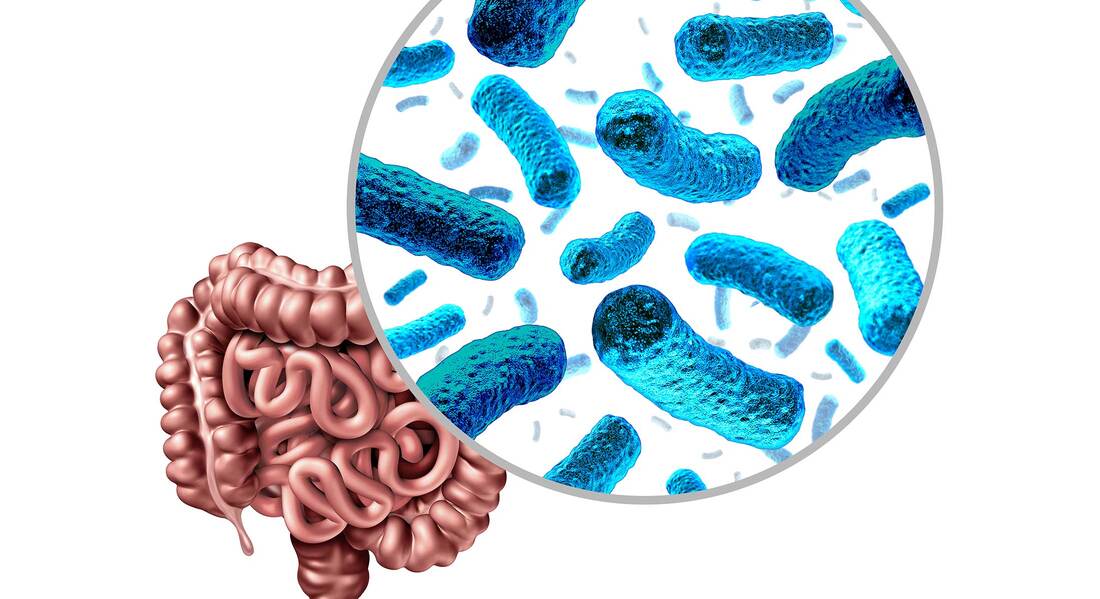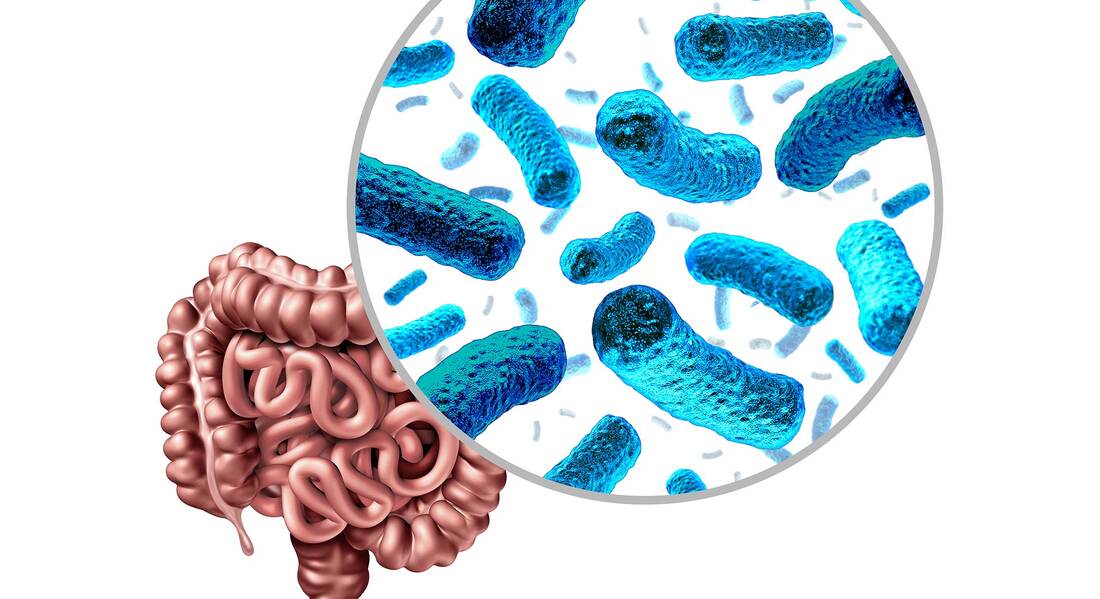Gut Health - Microbiome 101Did you know that there's a whole world of microorganisms residing in your gut? The term used to describe this vast, yet microscopic community is 'microbiome' or 'microbiota' which collectively refers to all the microbes - including bacteria, viruses and fungi - that exist in and on the human body. A whooping 95% of these microbes reside in your gastrointestinal tract, predominantly in the large intestine.
To put this population into perspective, there are ten times more bacterial cells in your body (40 trillion), specifically contained in your gut, as opposed to human cells (only 30 trillion) - meaning, you're more bacteria than human! Diving deeper into the gut microbiota, there are around 1,000 different species of known bacteria, each playing a different role in your body - but only a couple of hundred predominate. The collective weight of these bacteria can be up to 2 kilograms. The composition of the colony in your gut is as unique as your fingerprint. One third of gut bacteria is common to most people, while the other two thirds are individual to you. While some strains of bacteria are harmful, many others are extremely beneficial and necessary to keep your body healthy. When the number of harmful bacteria outweighs the number of friendly bacteria in the gut, an imbalance called dysbiosis can occur. So, it makes sense that in order to be at your healthiest, you need to ensure that your good bacteria are kept happy, healthy and as abundant as possible. The gut microbiota is a complex field of ongoing research in the medical community and is constantly under the microscope. Findings uncovered by new scientific investigations have greatly improved our understanding of the microbiota, and its systemic influence in the body. Studies have explored and identified links between gut health and the immune system, mental health, autoimmune diseases, endocrine disorders, weight, skin conditions and even cancer. Poor gut health not only relates to digestive discomfort, but can also restrict essential energy and nutrient supply to other bodily organs and systems, compromising their function. For example, the gut houses 70-80% of your immune system, so this can take a hit when the gut isn't performing properly, Essentially, the gut microbiota acts like another organ in your body, regulating health and disease. Reproduced from The Good Gut Guide, Orthoplex. Vanessa Winter BHSc (High Dist.), BEd, Dip.Nat., Dip.Herb.Med., NMHNZ SmartGENES Naturopathic Clinic
0 Comments
Commonly referred to as "leaky gut", Intestinal permeability can be measured using the lactulose/mannitol recovery test.
The test involves taking a drink that contains two water-soluble sugars that do not get metabolised by humans. If absorbed into the bloodstream via the gut, they are excreted into the urine, which is collected and tested. This is a simple urine test that also gives an insight into malabsorption issues. There are quite a number of functional testing options available for gut health. It is highly recommended that you get in touch to discuss if this is the right test for you. Vanessa Winter BHSc (High Dist.), BEd, Dip.Nat., Dip.Herb.Med., NMHNZ SmartGENES Naturopathic Clinic Acid Reflux is a condition in which the acid contents of your stomach wash back up into the oesphagus. This happens because a valve at the end of your oesophagus does not close properly when food arrives into the stomach. The acid then flows back upwards into your throat. Acid reflux happens to many people at some point. Pregnancy is a time when a lot of women will experience reflux due to the pressure in the abdomen, which will mostly self resolve post partum. However, for many, regular episodes of acid reflux is the first sign of an under-functioning digestive system. GORD/GERD (gastroesophageal reflux disease) is a related but more serious condition in which the acid contents of the stomach persistently regurgitate back up into the oesophagus. As the development of GORD is often multifactorial, identifying the key contributing factors is necessary to address and improve gut function, and reflux symptoms. Mechanisms that are associated with GORD include: Lower oesophageal sphincter dysfunction, oesophageal clearance, mucosal resistance, delayed gastric emptying, and the presence of a hiatal hernia or acid pocket. Generally diagnosis is made through clinical symptoms and the response to acid suppressing medications, and diagnostic tests such as upper endoscopy. From a naturopathic perspective, we want to work on a number of therapeutic goals:
Vanessa Winter BHSc (High Dist.), BEd, Dip.Nat., Dip.Herb.Med., NMHNZ SmartGENES Naturopathic Clinic A medically diagnosed condition, IBS is a functional digestive disorder affecting @ 11% of the population. Diagnosis normally occurs after testing has ruled out other conditions, and your symptoms are contained within the IBS criteria. IBS has no medically recognised effective treatment. Naturopathically, IBS is not seen as a single condition. Rather it is viewed as an umbrella term that encompasses a cluster of related conditions, that simply present with similar symptoms. These conditions can and often have a vastly differing set of causes. By putting aside the label, we come back to the # 1 naturopathic principle. Work with the patient, not the disease. What this means, is looking at your specific symptoms, and your specific causes in order to work to restore optimal function. Here at SmartGENES Naturopathic Clinic, we focus on functional, lifestyle, and nutritional factors that impact digestive function. Some of these include:
There are many testing options available. Complete Microbiome Mapping (GI Map) is a targeted and comprehensive testing option, with samples being sent to Australia for analysis. Vanessa Winter BHSc (High Dist.), BEd, Dip.Nat., Dip.Herb.Med., NMHNZ SmartGENES Naturopathic Clinic  There are hundreds of different types of bacteria living in the gut. Ensuring we have healthy colonies of the good strains of bacteria helps to prevent dysbiosis (incorrect gut flora), supports immune health, protects against the development of food sensitivities and maintains the health of the intestinal mucosa. They also metabolise certain foods and aid in the synthesis of nutrients such as folate and vitamin K. Top Gut Foods Probiotic Foods - adding good bacteria into our diet
As well as those that help, many common dietary and lifestyle factors are well known to compromise digestive health and function. Are you compromising your gut health with these:
Vanessa Winter BHSc, BEd, Dip.Herb.Med., Dip.Nat.,NMHNZ |
Vanessa WinterChristchurch Naturopath and Medical Herbalist with over 20 years experience in the field of natural health. Archives
May 2022
Categories |
Naturopath Christchurch
|
Vanessa Winter, Christchurch Naturopath
SmartGENES Naturopathic Clinic vanessa@smartgenes.co.nz |
This website and content contained within it is copyright to SmartGENES Naturopathic clinic
and may not be copied and used without permission. Please contact the website owner if you wish to add a link to this website. Thank You. |





 RSS Feed
RSS Feed